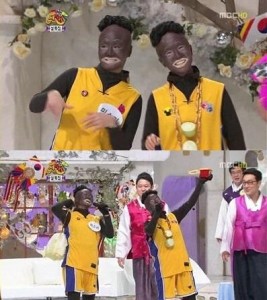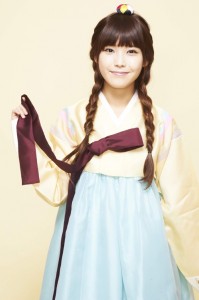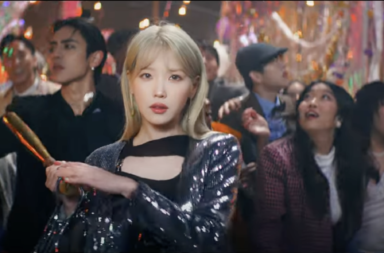 First Jonghyun and Shin Se-kyung back in 2010, then Junhyung and Goo Hara in 2011…gosh, I was getting worried that we wouldn’t fill our K-pop couple quota this year!
First Jonghyun and Shin Se-kyung back in 2010, then Junhyung and Goo Hara in 2011…gosh, I was getting worried that we wouldn’t fill our K-pop couple quota this year!
For a scandal that was launched by the still-photo equivalent of a sex tape, the IU–Eunhyuk Twitter scandal has been progressing in a disappointingly benign direction. Several days ago, a photo of a pajama-clad IU and a seemingly shirtless Eunhyuk was uploaded onto IU’s twitter, only to be taken down minutes later. LOEN Entertainment released a statement shortly after the scandal claiming that the photo was taken when Eunhyuk visited IU while she was sick sometime last summer. SM responded the next day with a proverbial “What they said.”
In light of the scandal, the buzz around netizenland was varied — there was something about a sofa, Eunhyuk’s penchant for boat-neck tees, and probably more than a few ELFs out there who were too busy wiping Donghae‘s imaginary tears to really care. And despite LOEN’s pleas for the public to “not exaggerate or make assumptions about IU and Eunhyuk’s relationship due to this incident” — let’s be real; no one visits their sick friends half-naked and selcas while they’re at it.
But at this point, it doesn’t really matter what LOEN or SM say about the matter. This isn’t a case of second-hand information uncovered by Dispatch’s photographers stationed at the Han River, where the information was probably passed through a number of hands and filtered down to be as unscandalicious as possible before being released to the public. Half of the IU/Eunhyuk scandal is substantiated by the fact that IU accidentally posted the photo on Twitter, leaving the public to connect the dots by themselves.
And the public hath spoken: Eunhyuk and IU did the naughty naughty, and there ain’t nothing that LOEN, SM, or President Lee Myung-bak himself can really do to change the public’s perception about it. Even if both LOEN and SM came out and said that IU and Eunhyuk were dating but left out the “sex” part, it wouldn’t take much for the public to fill in the blanks themselves. It really leaves something to be said about how the power of public opinion can turn a mere speculation into a widely-accepted “fact.”
But I digress. It’s barely been three days since the scandal kicked up, and already the buzz is starting to die down. This is somewhat surprising — sex scandals aren’t exactly a common occurrence in the squeaky-clean world of K-pop, let alone one that involves two young and extremely high-profile idol stars who are practically bound by their careers to maintain a pristine image at all times. One might think that the uber-conservative, Christian/neo-Confucian morals of South Korea would cause Koreans everywhere to incite a public outcry. Two unmarried children copulating?! How dare they!
The funny thing, though, is that the reaction on the Korean front has been fairly quiet. Sure, there’s the added fact that Korean fans have been well aware of a possible relationship between Eunhyuk and IU long before the scandal broke out to the rest of the world, but being in a relationship doesn’t always equate sex — and sex adds another, more controversial layer to the scandal. But even the news of this latest development didn’t result in a collective gasp from the Korean public.
 For international fans, it seems as if the Korean netizen reaction always plays a significant part in our understanding of the story whenever issues regarding race or sex arises in K-pop. Part of the reason might be that Korean media and pop culture serves as a scope for are observations of Korean society at large. When news of IU and Eunhyuk’s scandal broke out, the attention of international fans seemed to turn towards IU, voicing concern that IU’s career and reputation would be irreparably marred by this scandal. Many believed that because South Korean society places higher social expectations on women to be virginal and pure, IU will inevitably receive a lot more criticism from the Korean public simply because she is a woman. Furthermore, her image as an idol directly plays into the sweet, innocent girlwoman concept, which makes the potential for the backlash resulting from a sex scandal to be that much greater.
For international fans, it seems as if the Korean netizen reaction always plays a significant part in our understanding of the story whenever issues regarding race or sex arises in K-pop. Part of the reason might be that Korean media and pop culture serves as a scope for are observations of Korean society at large. When news of IU and Eunhyuk’s scandal broke out, the attention of international fans seemed to turn towards IU, voicing concern that IU’s career and reputation would be irreparably marred by this scandal. Many believed that because South Korean society places higher social expectations on women to be virginal and pure, IU will inevitably receive a lot more criticism from the Korean public simply because she is a woman. Furthermore, her image as an idol directly plays into the sweet, innocent girlwoman concept, which makes the potential for the backlash resulting from a sex scandal to be that much greater.
These are all legitimate concerns, and while there are still plenty of problematic comments floating around the Korean netizensphere (including one that paralleled IU to a bottle of dirty water and criticized her for selling a “deceptive” image), most of the reaction from the Korean public seems to be rooted in intrigue, not shock. For one, IU and Eunhyuk are an unlikely couple. But above all, IU’s famous girl-next-door image has been effectively debunked. But there is no public uproar; there isn’t even that much slut-shaming going on. There is, however, a good amount of logical thinking and even a little bit of snark:
[+352, -11] If IU’s the one that’s sick, why does Eunhyuk look more exhausted in the photo? [+1,114, -439] When Jiyeon’s webcam scandal erupted and her company was making excuses that no one believed, Jung Ga-eun still stepped up to defend her on her mini-homepage. IU is more well loved than Jiyeon to the point where it can’t even be comparable and so many celebrities consider her to be their family and yet there is not one celebrity that is stepping up to defend her. Celebrities aren’t even just quietly watching over the situation, they’re publicly ridiculing her saying things like how they want to visit her when she’s sick too… That can only mean that these celebrities have already figured out the truth about how IU’s really like. [+496, -29] Loen really sucks at dealing with stuff like this. Why don’t they know that making up ridiculous excuses like this will only cause more trouble? They basically ran into a fire while holding explosives to their chests. If they just said that they were dating, opinion wouldn’t be as divided as it is now. Because they made up a BS story, they’re just fostering more hate. [+1,055, -78] Eunhyuk is a real man that visits the sick not only topless but also by bringing his own sofa
For non-Korean onlookers, the internet brings increased visibility to the underbelly of K-pop and Korean culture. And as the K-pop craze continues to spread globally, international audiences have expressed an increasing amount of criticism towards the problematic facets of Korean society. Most of the time, this criticism is deserved, particularly when the issue deals with racism and cultural appropriation. This is in particular consideration of the fact that so many Korean entertainment companies are now trying to sell their products directly to non-Korean fans — some of whom, you know, might be a little offended if the same broadcasting company that featured blackface on one of their shows is now asking them to pay a fortune for tickets to a K-pop concert in LA.
The increased dialogue on the dynamics of Korean culture and society within the context of K-pop is definitely necessary. But one should exercise caution in assuming that the Korean public will act in a certain manner in response to a certain event because it is their “culture” to do so.
 The IU/Eunhyuk scandal is a particularly potent example because the biggest risk of revealing any K-pop idol relationship is the impact that the scandal will have on the idols’ careers. Because K-pop still primarily caters to Korean audiences, the fate of the idols’ careers then lies mostly in the hands of the Korean consumer public. Thus, the main object of concern for international fans (who are at least a little concerned about the welfare of the idols’ careers) is, “What will the Koreans think?”
The IU/Eunhyuk scandal is a particularly potent example because the biggest risk of revealing any K-pop idol relationship is the impact that the scandal will have on the idols’ careers. Because K-pop still primarily caters to Korean audiences, the fate of the idols’ careers then lies mostly in the hands of the Korean consumer public. Thus, the main object of concern for international fans (who are at least a little concerned about the welfare of the idols’ careers) is, “What will the Koreans think?”
In theory, international fans have no way of knowing the answer to this question because most of them have never set foot in Korea before, and their image of Korea is one that is built by the videos they watch and the blog posts they read on the internet and maybe the occasional skimmed Wikipedia article on Confucianism. But even with a limited knowledge of Korea that is composed largely of second-hand information, international audiences seem to have a peculiarly rigid picture of what Korea is really like. Judging from the comments I’ve seen among international fandom over the years, many international fans regard Korea to be a sexist, racist, homophobic, overly conservative, politically corrupt, fundamentally Christian country that is stubbornly attached to traditional Confucian values and is unwilling to be “progressive” like the rest of the [Western] world.
There may be some truth to these assumptions, but the real risk in labeling the whole Korea as a sexist, racist, what-have-you country is failing to recognize the historical and political significance of why this might be. There is a huge difference behind the culturalist perspective: attributing the behaviors of an entire society to their “culture,” and the deterministic perspective: recognizing that there are specific, historical conditions why certain sexist and racist behaviors continue to persist in Korean society today. Acknowledging the historically grounded roots of problematic behaviors does not excuse them; perhaps it can be even more productive than simply writing off these problematic issues as “cultural.” In fact, taking a culturalist perspective towards another society or country is highly problematic in itself, especially when those from Western societies do so. To be honest, the idea of a Westerner claiming that “Korea is a racist country” with a “backward culture” (arguments I’ve repeatedly seen come up verbatim within international fandom) reeks a bit too heavily of imperialism for my own personal comfort.
Bringing it back to IU and Eunhyuk. As aforementioned, there have been a fair share of comments about IU from Korean netizens that are problematic no matter how one looks at it. The issue of sexism in K-pop and Korean culture is something that is repeatedly addressed within the English-speaking K-pop blogosphere, to the point where you don’t need me to tell you that a netizen’s comparison of IU to a bottle of dirty water is problematic. But the real, seldom-addressed issue is the way in which we as international fans “expect” the Korean public to react to certain issues. A kneejerk reaction to the IU/Eunhyuk scandal might assume that the Korean public will be unfairly harsh towards IU because of the Korean cultural value placed on the purity and innocence of women, and that IU’s career will be irrevocably damaged as a result while Eunhyuk will probably walk away scot-free. But within this reaction, there’s virtually no consideration of the possibility that the Korean public could actually care less about IU having sex, or at least not care enough to actively punish her for her sins and condemn her to the depths of K-pop hell.
One might argue that similar scandals have occurred in the past where public criticism ended up taking a significant toll on the artists’ careers — Baek Ji-young and Ivy were forced onto hiatus due to leaked or rumored sex tape scandals back in 2000 and 2007, respectively. T-ara‘s Jiyeon went under harsh public scrutiny for her topless webcam video, and more recently, SPICA‘s Juhyun was criticized for her relationship with Shinhwa‘s Junjin, who is six years her senior. The idea that IU’s career will be damaged in the same way runs on the assumption that the Korean public’s reaction towards anything related to idol relationships or sex will be the same, regardless of time or circumstance. Funnily enough, Ivy and Baek Ji-young’s scandals happened more than five years ago, and both of them were able to recover and come back to the stage without scarlet letters pinned to their performing outfits. Jiyeon’s scandal was said to be “covered up” and never really came back to the surface — but this cover-up wouldn’t have been able to happen if netizens didn’t stop caring. And apparently Juhyun and Junjin broke up recently, but I don’t think anyone was really paying attention in the first place.
 The notion that Korea’s inherently sexist outlook towards women will inevitably cause a backlash strong enough to damage IU’s career is problematic in itself. It’s purely a culturalist argument that relies heavily on the assumption that Koreans collectively behave in a certain way due to their shared culture. And it’s obvious that the Korean netizen response is not zoned in on the fact that IU had sex as much as they are pissed about the falsehood of IU’s idol image. This is an interesting issue in itself because it’s not as if the Korean public really bought into the idea that IU is an innocent little doll who maintains an offstage personality as pure and sugary-sweet as her onstage image. Korea is not that stupid. A lot of the netizen comments express anger and discontent over IU’s onstage image, pointing out that this scandal shows exactly how far detached from reality such an image can be.
The notion that Korea’s inherently sexist outlook towards women will inevitably cause a backlash strong enough to damage IU’s career is problematic in itself. It’s purely a culturalist argument that relies heavily on the assumption that Koreans collectively behave in a certain way due to their shared culture. And it’s obvious that the Korean netizen response is not zoned in on the fact that IU had sex as much as they are pissed about the falsehood of IU’s idol image. This is an interesting issue in itself because it’s not as if the Korean public really bought into the idea that IU is an innocent little doll who maintains an offstage personality as pure and sugary-sweet as her onstage image. Korea is not that stupid. A lot of the netizen comments express anger and discontent over IU’s onstage image, pointing out that this scandal shows exactly how far detached from reality such an image can be.
[+1,759, -224] I don’t care what IU does in her private life, but she’s the one that took on the little girl lolita concept and always said how she doesn’t know anything. [+132, -34] And here she was trying to push for the innocent nation’s little sister image ㅋㅋㅋ There was a reason people called her a sly fox.. ㅋㅋ [+40, -3] Honestly, though, I know that IU is lovely but isn’t it obvious that she’s a fox? ㅋㅋ She doesn’t look all that innocent so where’s all this shock coming from
Again, these comments are somewhat problematic in that they place the responsibility of IU’s on-stage concept squarely on IU’s shoulders rather than her management company, but it’s clear that the topic of contention isn’t that IU had sex; it’s that she was selling an “innocent” image while having sex. This can go one of two ways: either the Korean public realizes that IU is an adult who is not bound to her onstage concept and is free to do whatever she wants in her personal life (with the added consideration that she is a public figure and ought to act with discretion, as is the industry norm), or they insist that IU has some sort of inherent loyalty towards her manufactured stage image, and that she should maintain this stage image by making sure that everything she does in her personal life aligns perfectly with whatever image she’s selling onstage. Now which of these two options sounds more logical? Only the nuttiest of IU’s nutty ahjussi fans might agree with the latter — but they are not powerful enough to hold significant sway over IU’s career. And they are certainly not representative of the Korean public at large.
Criticism of Korean culture and society amongst international fandom is a cyclical process largely built on confirmation bias. Whenever problematic issues arise in K-pop, the international fan reaction is more or less the same. Over the course of time, the discussion surrounding these problematic issues becomes more and more coarse — rather than trying to break down the root of the problem, we attribute the whole mess to “culture” thus conflating an entire country and its people with a set of perceived cultural expectations, all the while shaking our heads because “Korea never changes.”
The IU/Eunhyuk scandal is just the latest example of this, made all the more potent because this time Korean netizen reaction is just as important to the scandal as the scandal itself. And the Korean netizen reaction is not at all what international fans expect of Koreans “culturally.” Of course, international fandom is still waiting with their popcorn for the wave of Korean rage to come, but by the looks of things, it won’t be coming anytime soon.

